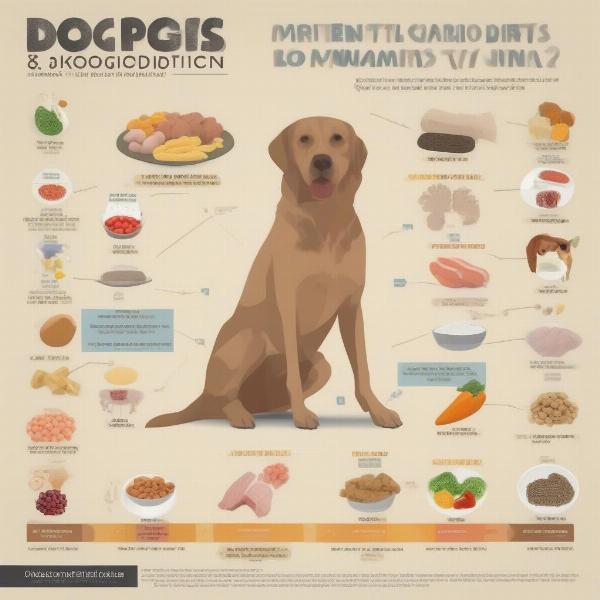Famous Uncle Al’s Hot Dogs might conjure up images of sizzling sausages, but here at ILM Dog, we’re focusing on the canine kind! This article isn’t about feeding your furry friend processed meat, but rather about understanding your dog’s nutritional needs and providing them with a healthy, balanced diet. Whether you’re a seasoned dog owner or just starting your journey with a new pup, understanding what constitutes a “hot dog” diet in the canine world is essential. We’ll explore what makes a diet truly beneficial for your dog, debunk common misconceptions about dog food, and guide you toward making informed decisions for your beloved companion.
Understanding Your Dog’s Nutritional Needs
Just like humans, dogs require a balanced diet to thrive. This means providing them with the right proportions of proteins, fats, carbohydrates, vitamins, and minerals. A diet lacking in essential nutrients can lead to health problems, including skin issues, digestive upset, and even more serious conditions. So, what exactly does a healthy “hot dog” diet entail? It’s all about choosing high-quality dog food, whether kibble, wet food, or a carefully planned raw diet.
 Dog Nutrition Chart
Dog Nutrition Chart
Protein is crucial for muscle development and repair, while fats provide energy and support healthy skin and coat. Carbohydrates offer another source of energy and fiber for digestive health. Vitamins and minerals are essential for various bodily functions, from immune system support to bone health. Choosing a dog food formulated for your dog’s age, breed, and activity level is key to ensuring they receive the right balance of nutrients.
Debunking Dog Food Myths
The pet food industry is filled with marketing claims and myths that can make choosing the right food for your dog confusing. One common misconception is that grain-free diets are always better. While some dogs may have grain allergies, for most, grains can be a healthy source of nutrients. Another myth is that all natural dog food is superior. The term “natural” isn’t strictly regulated, so it’s important to look beyond marketing buzzwords and examine the ingredient list.
“Many dog owners get swayed by trendy diets without fully understanding their dog’s specific needs,” says Dr. Emily Carter, DVM. “Consulting with your veterinarian is crucial for determining the best dietary approach for your furry friend.”
Choosing the Right “Hot Dog” Diet for Your Pup
Selecting the best food for your dog involves considering several factors, including their age, breed, activity level, and any underlying health conditions. Puppies require a diet rich in protein and calories to support their rapid growth, while senior dogs may benefit from a lower-calorie formula with added joint support supplements. Active breeds need more calories than less active ones.
“Don’t be afraid to experiment with different types of dog food to find what your dog enjoys and tolerates best,” advises canine nutritionist, Sarah Miller. “Always transition slowly to a new food to avoid digestive upset.”
Conclusion
Feeding your “hot dog” a healthy diet is a vital part of responsible dog ownership. By understanding their nutritional needs, debunking common myths, and choosing a high-quality food, you can ensure your furry friend stays happy, healthy, and full of energy for years to come. Remember, “famous Uncle Al’s hot dogs” in the canine world means providing a balanced, nutritious diet tailored to your dog’s individual needs.
FAQ
- What are the essential nutrients for dogs? Dogs need proteins, fats, carbohydrates, vitamins, and minerals.
- Is grain-free dog food always better? No, only dogs with allergies require grain-free food.
- What should I look for on a dog food label? Check for clear ingredient lists, AAFCO statement, and nutritional adequacy statement.
- How do I choose the right food for my puppy? Choose puppy-specific formulas rich in protein and calories.
- What are some signs of a nutritional deficiency in dogs? Dull coat, skin issues, digestive problems, lethargy.
- Should I consult my vet about my dog’s diet? Yes, always consult your vet before making significant dietary changes.
- How do I transition my dog to a new food? Gradually mix the new food with the old food over several days.
ILM Dog is your go-to resource for expert advice on all aspects of dog care, from breed selection to nutrition and training. We offer a wealth of information to help you provide the best possible care for your canine companion. For personalized guidance, reach out to our team of experts. Email: [email protected], Phone: +44 20-3965-8624. Visit ILM Dog for more valuable tips and resources to help you navigate the world of dog ownership.